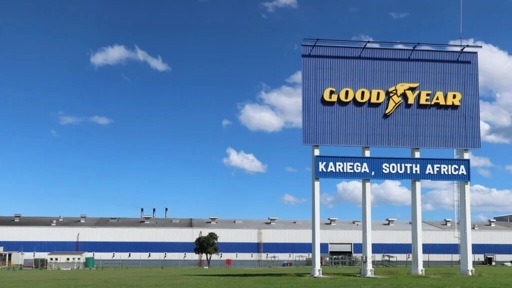After nearly 80 years of tire production, the announcement of the closure of Goodyear’s Kariega manufacturing plant has dealt a major blow to South Africa’s already fragile industrial sector. The National Union of Metalworkers of South Africa (NUMSA) insists that the plant remains viable, but accuses the multinational tire giant of pursuing a profit-first strategy that sacrifices workers, communities, and the broader manufacturing base.
Speaking to People Dispatch, NUMSA spokesperson Phakamile Hlubi-Majola said of the decision to shut down the facility:
“Goodyear was not open to alternatives, it seemed as if they had already made up their minds that they would close,” she explained. “However, they did cite issues such as the dumping of cheap tires into the market as one of the reasons which were undermining their performance.”
A devastating blow to Kariega and Gqeberha
Goodyear’s exit leaves hundreds of workers jobless in the Eastern Cape, the province with the highest unemployment rate in South Africa. NUMSA estimates that most workers are unlikely to find new employment soon.
“The closure is devastating for the broader Kariega and Gqeberha communities,” Phakamile said. “There are very few companies of this size in the area. The ripple effects will also hit downstream industries linked to tire production.”
NUMSA successfully negotiated improved severance packages, an increase from Goodyear’s initial offer of R50,000 and two weeks per year of service to R100,000 and four weeks’ pay per year. Still, the union insists this is cold comfort in a depressed economy where unemployment is entrenched.
A crisis of deindustrialization
Goodyear’s retreat is not an isolated case. South Africa’s steel sector has seen mass retrenchments, with companies like Macsteel shedding hundreds of jobs. NUMSA warns of a pattern: multinationals are abandoning local production, hollowing out industrial capacity, and turning South Africa into a dumping ground for cheap imports.
“This crisis affects all sectors,” Phakamile said. “It is the direct result of neoliberal policies that hollow out the state for the benefit of the private sector. Our government has chosen this path, and the cost is deindustrialization and mass unemployment.”
NUMSA’s press statement reiterates this warning: “The closure of GYSA sets a dangerous precedent. Other companies can do the same, closing manufacturing while maintaining distribution to dump goods in South Africa.”
NUMSA’s demand: an alternative industrial path
NUMSA argues that South Africa urgently needs a state-led industrial strategy that prioritizes manufacturing. They are calling for:
Protective tariffs across the automotive, steel, and tire sectors. To protect what remains of the manufacturing base.Stronger public procurement policies to drive localization, arguing that it’s critical to drive localization and designation through public procurement processes.An end to tire and steel dumping through decisive trade measures.Government accountability on incentives, ensuring foreign brands invest in local production.A review of outdated taxes hindering the domestic auto sector.
The union also points to energy and logistics failures; Eskom’s unreliable grid and Transnet’s rail decline, as systemic threats to industrial revival.
NUMSA frames this struggle as bigger than one plant. “This is about the survival of South Africa’s manufacturing base,” said Phakamile. “We need decisive state intervention, just as China has done to protect its industries. Otherwise, the future is mass unemployment and economic collapse.”
NUMSA has made it clear that it will continue to do everything within its power, in partnership with government and strategic stakeholders, to secure sustainable solutions that protect jobs and safeguard the future of the plant.
The post NUMSA urges alternative industrialization path to save South Africa’s manufacturing as Goodyear exits appeared first on Peoples Dispatch.
From Peoples Dispatch via this RSS feed


